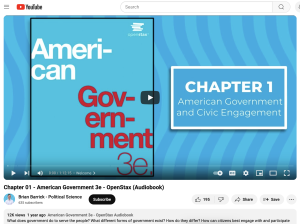[Political Science] OpenStax American Government Audiobook
Description of the Resource:
Introducing the first full-length audiobook production of a popular OpenStax title. American Government 3e, widely used in political science classrooms nationwide, is now even more accessible than before. Producers Brian Barrick and Sara Arya developed a professionally narrated audiobook adaptation of the textbook, giving learners additional ways to interact with the content. Each of the 17 professionally narrated textbook chapters have been made available for free on top streaming platforms. Students can engage with over 30 hours of high-quality audio content on Spotify, YouTube, and Apple Podcasts.
The resource has proven to be proven to be popular. As of June 2024, the project chapters have been streamed or downloaded over 125,000 times. YouTube streaming alone accounts for over 2.5 years of cumulative streaming time. The success of this experimental project suggests a growing demand for future OER audio projects.
In order to encourage instructor adoption, an instructor Canvas page has been developed and published to Canvas Commons. This accessible resource includes embedded audio players, embedded textbook chapters, and links to the OpenStax resources. This allows instructors to seamlessly integrate these free materials into their existing courses, which increases accessibility and learning options for their students.
How This Resource Integrates Diversity, Equity, and Inclusion Principles and Practices:
Audiobooks are a tremendous resource for diverse groups of learners. By adopting this free OER audiobook, instructors can ensure that their course content is more accessible. Students with visual impairments and learning disabilities now have an additional way to engage with the textbook. The language skills of ESL learners are also enhanced when listening to new terms and concepts with accurate pronunciation. The audiobook has also been popular with busy students juggling their assignments with their demanding parenting or work schedules. Commuters can transform their downtime into productive learning opportunities. Auditory learners can process the material in a manner more natural to their learning preferences. Additionally, many students have found success by listening to the audio while reading the textbook. This multimodal approach to learning can support increased understanding, better content retention, and increased satisfaction.
Testimonials and/or Reviews:
“I am a disabled student. I have really bad dyslexia and I work full time. Your class was so inclusive from the beginning. When I saw that you not only included the free online textbook but had a free audiobook link, I cried grateful tears because I’ve never had a teacher who even bothered. In previous classes I’ve had to struggle to make the textbooks more accessible myself. The audio book textbook allowed me to even study at work making it easier for me to come home after long shifts and actually be able to take care of myself without having to feel guilty over having to choose between sitting down and forcing myself to read or going for a walk to decompress… You made it accessible, easy to understand, and less stressful. If more professors had your passion I probably wouldn’t have dropped out when I was 23.”
– LAHC Student, Summer 2023, Anonymous Course Feedback Form
“Thank you so much for making this! I am a student who works 12 hour shifts. Having this allows me to listen to the text and then go home and read it. It has helped me immensely and my grade shows it! I wish I had this same opportunity in my other classes!”
– YouTube Comment
“What I loved most [about the course] was the audiobook podcast. I have dyslexia, and it helped me a lot to pass this class. I regret not taking it in person.”
– LAHC Student, Online Course Feedback
I learn so much better from audio than I do visual so THANK YOU for this. I will definitely share with my fellow classmates and teacher!
– YouTube Comment
Tips, Tricks, and Advice from the Faculty Author(s) Regarding OER Creation:
Developing an OER project requires both intrinsic motivation and external support. Because you will spend so many hours developing the project, it is crucial that you have a driving and sustainable interest in achieving the project’s completion. The difficult work of following that motivation is eventually rewarded with an expanded skillset. This project required both producers to reach beyond their areas of expertise and learn new skills. Brian Barrick spent countless hours researching audio equipment, editing software, podcasting, and publishing platforms. These skills were necessary for the successful completion of the project and also resulted in improvements to Brian’s teaching, such as improved strategies for developing other types of course content. Sara Arya overcame self-doubts about her accent as an ESL learner during the narration process. Her participation in the project gave her increased confidence to take on student leadership opportunities at her new university.
External support is also crucial. Our partnership with the CC-ECHO leadership team helped to ensure that the project was finished on time. Having external partners means increased accountability. When others are relying on you, your chances of following through with your project are greatly enhanced. We are also grateful to CC-ECHO for funding the project, which allowed us to purchase high quality audio equipment and dedicate the many hours needed to complete the project.
Check out OEG Voices 053: People and OER Projects from CC ECHO to hear about the author’s experience creating this OER and more!

